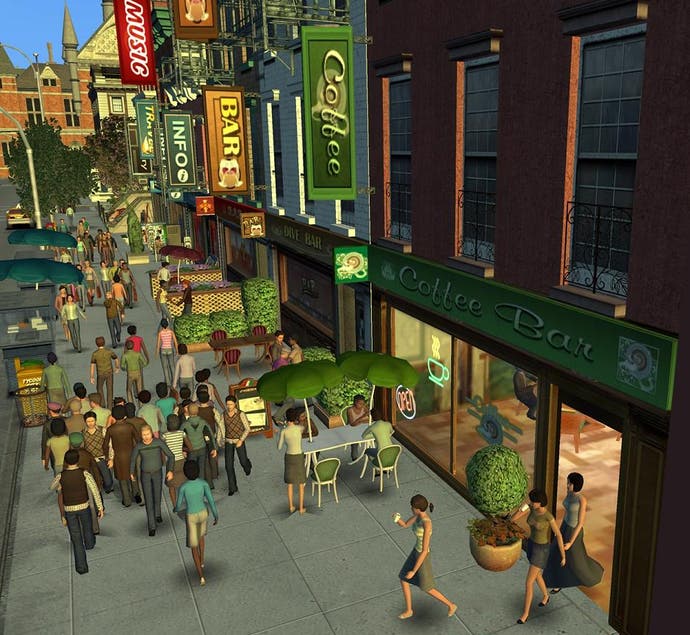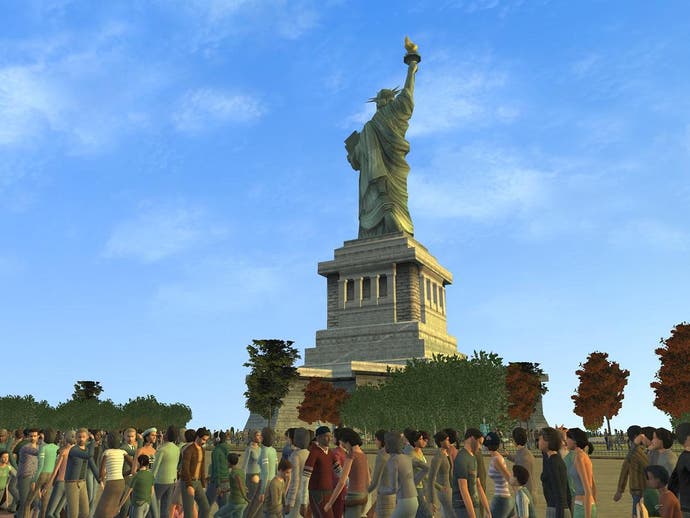Tycoon City: New York
I want to make a part of it!
New York, New York, so good I'll build it twice. In the two game modes, natch.
(They're Sandbox and Build New York, surprisingly-early-incursion-of-facts-into-a-review fans.)
Developer Deep Red has quite a history in this manner of management games, arguably reaching an apex in the economic fisticuffs of the underappreciated Monopoly Tycoon. Tycoon City, on the surface, seems to be a long-awaited return to the terrain in a spiritual-sequel manner. Sadly, the excitement is misplaced. It's a good game, and shares certain elements with Monopoly Tycoon, but in terms of play provides a hugely different experience.
In the main mode, you're placed as an entrepreneur in New York City and charged with becoming incredibly rich indeed. You do this by constructing a business empire, by building businesses, shops, services, entertainments and trees, then reaping the profits. Essentially, it's all about placements - put the right sorts of shops to serve the right demographic in the right places. Group similar shops together to create a zone-bonus - as in everyone knows that this is the place to go to get your expensive clothes, or whatever. Occasionally challenges appear, which can be satisfied for suitable rewards. Get enough of a certain chain of shops and construct HQ to collect greater rewards, and see your palace to commerce grow ever higher as your rewards grow.

It's fun and compulsive. It looks great: hell, it's one of the best-looking management games we've ever seen. But ultimately, intermixed with the joy of seeing a city spring up before your eyes, there's the sense of something lacking.
Actually wrestling down what prevents this being more entertaining is tricky: its positive and negative attributes are so tightly mixed.
Take the interface, which varies between the absolutely excellent and the slightly annoying. For example, the placing of your buildings. When you choose a position for your business you immediately get its zone of influence highlighted and all the accommodation blocks in the area colour-graded depending on how much they'd be interested in the shop. This provides the information to make an informed decision on where to place your latest Tourist Trap in an impressively efficient manner.
However, in other areas it frustrates. To take the same placement information, you'll obviously be interested in whether there are any competing businesses in your zone of influence. When you've actually constructed your business you're able to select a tag which gives you information on your competitors in the area; however, by then it's too late. If the game highlighted competing businesses when placing, it'd have allowed an easier access to strategy. As it is, if you're obsessive about your profits, you'll have to carefully examine the neighbourhood for other art museums, or whatever. Even at the most basic, functional level, the game's tendency to give animated menus - so slowing down access to the facts - grates a little. When it's clear that part of the design philosophy has been to be as friendly as possible, these tiny things which alienate the gamer are a little bemusing.
And it's Tycoon City's design philosophy which makes it leave this review with a warm handshake and a smile rather than the full on hot-tongue-action embrace that I offered Monopoly Tycoon. It's all a little too nice. While Monopoly Tycoon was an economic wargame, based around ruthlessly undercutting the opposition and looking for gaps in the market, this is a construction game. There are competitors, but there's never the sense of actively screwing over the opposition that Monopoly Tycoon revelled in. Or to put it a simple way, where in Monopoly Tycoon you were in a real danger of actively losing, here, failure means just not doing as well as your peers. It's about Building New York as well as you can, and the reward being a job well done rather working over another guy in a suit so hard that he ends up throwing himself out of his penthouse office's window in despair.

For example, take the main mechanics of the pair. Monopoly Tycoon revelled in the cross between quality of service and cost of service, with you actively trying to undercut the opponents. Here, there's none of that micromanagement. You put a shop down, its prices are set. Instead you differentiate from the opponents with how you improve the shop, with you determining what decorations, extra staff or whatever you have. However, these aren't connected to actual money but rather an abstract "Improvement point" system, with the player gaining more by purchasing new properties and completing the in-game challenges. Each shop has a limit on how much can be spent on it, and you're able to remove improvements from other buildings to free up points for essential expansions elsewhere. To start with, it's fairly demanding forcing you to pay attention to your reservoir of points and deciding what improvements are necessary and which can be disregarded. However, once you've beaten a few challenges, you've gained enough points to not have to worry too much about the level at all. Essentially, rather than worrying about your opponents, you just make your shops the best you can. There's no service/quality element to worry about. It's a building game, not a game of competition.
It's this basic lack of thrill or challenge which limits Tycoon City's appeal, at least to the gamer audience. It's entirely possible that Tycoon City will find an audience for the more casual player with its less stressful lifestyle, but that's the sort of design decision which gains sales not marks. And if it does succeed, there's no shame here - in terms of being a construction game, it provides low-level charm and pleasure. The New York it creates is probably the greatest gaming facsimile of arguably the most iconic city in the world, with every street corner alive and vibrant. It's a great place to be, stirring to construct and entertaining... it just doesn't grab in a visceral manner.
It's a pleasurable trip to the not-so-mean streets of New York, but you can't help but wish it were something more.

